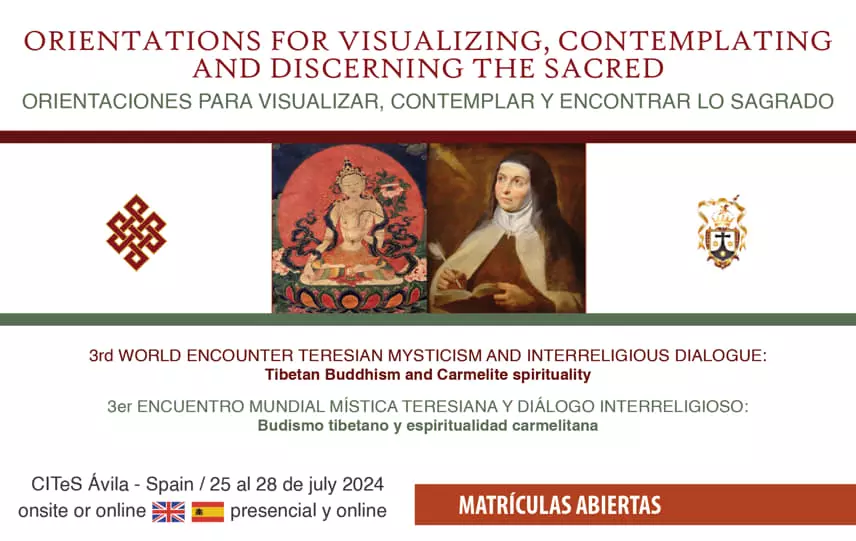Spanish version
Tibetan Buddhism and Carmelite spirituality
ORIENTATIONS FOR VISUALIZING, CONTEMPLATING AND DISCERNING THE SACRED
International Teresian-Sanjuanist Center (CITeS), "University of Mysticism", Ávila (Spain),
Centre of Buddhist Studies, The University of Hong Kong,
Fundación Dharma-Gaia,
from 25 to 28 July 2024
Face-to-face and online
Carmelite mysticism and Buddhist mysticism have developed over the centuries as two distinct ways of lived spirituality . The general theme for this meeting is to explore the role of visionary revelation in the pursuit of wisdom. Visualizing, contemplating, and encountering the deity are essential practices in the Carmelite tradition and in Tibetan Buddhism. These practices help foster spiritual growth and deepen the practitioner's relationship with “the sacred.” In addition to traditional elements, there are various cultural, philosophical, and theological contexts that come to play, in addition to shared elements in any commitment to spirituality. Both soteriological traditions emphasize the importance of morality, prayer and contemplation as a means of achieving union with the "ultimate." The Carmelite mystic seeks union with God through a process of self-knowledge and the person of Jesus Christ, which implies an exercise of loving attention and a readiness for the divine presence. The Buddhist mystics seek to achieve awakening through the realization of all-encompassing compassion and the perfection of wisdom.
Each tradition of mysticism places a high priority on discipline, contemplative and ritual practices. Furthermore, both traditions emphasize the importance of purification for transcending the limitations of the ego, as well as the value of suffering for developing the spiritual self, and the view of the phenomenal world as a manifestation of the divine. As a prerequisite for reaching the higher realms of spiritual understanding, both emphasize the cultivation of virtues such as humility, compassion, and devotion, as well as non-attachment.
It is our intention to facilitate genuine and fruitful dialogue, and to work together as a means of sharing paths of wisdom for a compassionate and harmonious world, without denying or attempting to reduce the differences between the two religious traditions. We aim to promote this in a spirit of equality, mutual respect, and curiosity.
PROGRAM
THURSDAY, JULY 25
17.00 Inaugural Act
17.30 The importance of interreligious dialogue between Christianity and Buddhism and the objectives of the encounter.
Carmelite perspective: Dr Jerzy Nawojowski, OCD, Director and Professor of CITeS, "Universidad de la Mística", Ávila, Spain.
Buddhist perspective: Dr Georgios T. Halkias, Director and Associate Professor of the Center for Buddhist Studies at the University of Hong Kong, PRC.
18.30 “The Order of Carmel Discalced and the Teresian Mystique.” Dr Saverio Cannistrà, OCD. Doctor in theology. Former Superior General of the Order of Discalced Carmelites. Formator and Parish Vicar, San Pancracio, Rome.
19.30 “The Base, the Path and the Fruit in Tibetan Buddhism.” Dr Phuntsok Wangchuk, Honorary Lecturer, Center of Buddhist Studies of the University of Hong Kong, PRC
FRIDAY, JULY 26
08.00 Mass
08.30 Buddhist Ceremony
10.00 “To emphasize the virtues greatly, but not the rigour. Teresa or the asceticism of friendship.” Sister María José Pérez, Discalced Carmelite of the Monastery of Puçol, Valencia, Spain.
10.45 “Perspectives from Tibetan Buddhism on discipline and morality.” Dr Catherine Hardie, Assistant Professor of the Centre of Buddhist Studies of the University of Hong Kong.
12.00 “Morality, asceticism and monastic discipline. Comparative perspective.” Dr Francesc Torradeflot Freixes, Director of UNESCO Association for Interreligious Dialogue. Director of AUDIR, Barcelona..
12.30 - 13.15 Round table. Dr Francesc Torradeflot Freixes.
17.00 “The pre-contemplative experience” Dr Juan Antonio Marcos Rodríguez, OCD, Professor of CITeS and of the Pontifical University Comillas (Madrid).
17.45 “Meditation on the deity in the tradition of Tibetan Buddhism.” Dr Klaus-Dieter Mathes, Professor of the Centre of Buddhist Studies of the University of Hong Kong.
19.00 “Prayer and meditation. Comparative perspectives’ Dr Francisco Díez de Velasco Abellán, Professor of History of Religions at the University of La Laguna, Spain.
19.30 Round table. Moderator: Dr Francisco Díez de Velasco Abellán.
20.00 Buddhist meditation workshop guided by the meditation master. Venerable Khenpo Kelsang Nyima, Abbot of Rumtek Monastery, Sikkim, India.
SATURDAY JULY 27
08.00 Mass
08.30 Buddhist Ceremony
10.00 “The mystical visions and the encounter. Catholic perspective.” Fr Francisco Brändle OCD. Prior of the Carmelite desert of Las Batuecas (Spain).
10.45 “Mystical Visions and Encounter. Tibetan Buddhist perspective” Dr Georgios Halkias. Director and Professor of the Centre for Buddhist Studies of the University of Hong Kong.
12.00 “The mystical visions and the encounter. Comparative perspective” Dr Xabier Pikaza Ibarrondo. Professor Emeritus of the University of Salamanca, Spain.
12.30 Round table. Moderator: Dr Xabier Pikaza Ibarrondo.
17.00 Ceremony of the IV International Prize Teresa of Jesus and Interreligious Dialogue. Presentation of the accessits. Award Ceremony.
https://www.mistica.es/noticias/iv-international-award-teresa-of-avila-and-the-interreligious-dialogue
20.00 Meditation workshop: practical workshop with guides for the practice of Teresian meditation. Myrna Torbay OCDS. Secretary-General and professor of CITeS “Universidad de la Mística”, Ávila, Spain.
SUNDAY JULY 28
08.00 Lauds
08.30 Buddhist ceremony
10.00 “The Ultimate Objective. Catholic perspective.” Dr Francisco Javier Sancho Fermín, OCD, Professor at CITeS, "Universidad del Mística", Ávila, Spain.
11.00 “Actualizing the Sacred Ultimate in Buddhist Mysticism.” Khenpo Yeshi, PhD Candidate at UC Berkeley University.
12.00 Round table. Moderator: Dr Justin Sloan Whitaker, Ph.D., (2017), Goldsmiths, University of London, UK. Senior Co-Respondent of Buddhistdoor Global, Hong Kong, PRC.
12.30 Round table. Moderator: Dr Justin Sloan Whitaker, Ph.D. (2017)
13.00 Closing of the congress


